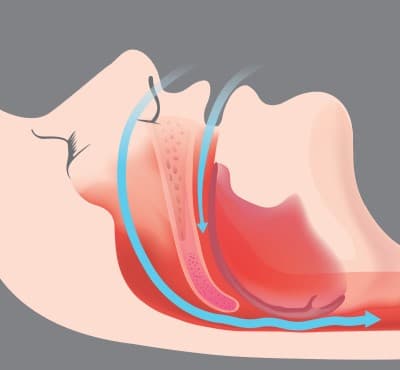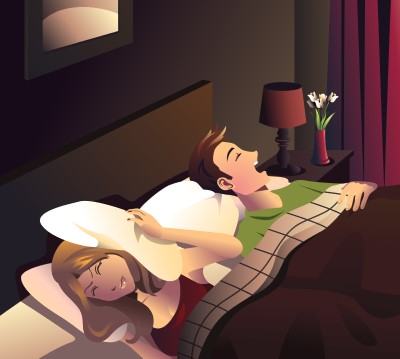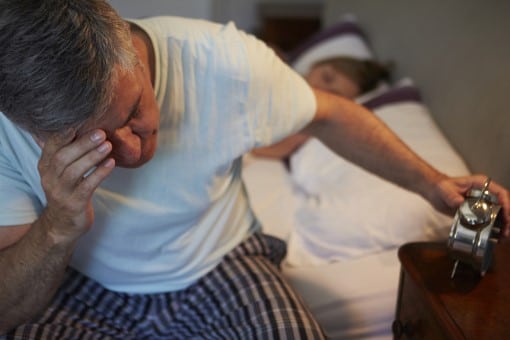
Can snoring lead to divorce?
By Jason Wooden, PhD | August 9, 2021
While there’s no direct evidence showing snoring can cause divorce, it’s a common complaint for millions of couples. Up to 40 percent of couples are sleeping separately and one in six say they’ve considered leaving.
Sleep-deprived people are more short-tempered, more likely to argue, suffer from low energy and other barriers to intimacy, and are less appreciative of each other.
Your options include ear plugs, white noise, oral appliances, sleep apnea treatment, sleep counseling, couples counseling, and a sleep divorce at least on a temporary basis.
Why it’s not so crazy if you’re curious whether snoring can lead to divorce
Snoring is a common complaint for millions of couples.
It ruins sleep, makes for miserable nights and days, and can chip away at the strongest of relationships.
So, it’s not so crazy to wonder whether someone’s snoring can put you on the road to divorce.
Like any health crisis, chronic sleep loss can add a ton of stress to relationships. Research has shown a link between decline in health and marriage quality.
For better or worse, almost 50 percent of all marriages in the United States will end in divorce or separation. (Around the world, some countries are higher and some lower.)
Among the more common reasons for divorce are:
- infidelity
- lack of commitment
- money issues
- communication issues
- addiction issues
Where does snoring fit in on this list?
We know it’s pretty prevalent since 45 percent of adults snore at least occasionally.
And for the record, both sexes snore – about 57% of men and 40% of women
Can a spouse’s or your snoring really lead to the downfall of your marriage?
As tough as things may seem, don’t give up.
We’re going to a look at what’s happening, it’s connection to divorce, and some practical remedies you can do to get things back on track.
Why are they snoring so much?
Snoring is what happens when air flowing through your mouth and nose is obstructed. As you breathe, the tissues in your throat vibrate resulting in that loud and annoying noise.
Air can be obstructed for different reasons including issues with your nose, tongue, mouth, or throat.

Almost 50 percent of adults snore at least occasionally.
People tend to snore more as they get older, most likely due to changes in their body.
Besides getting older, some of the other risk factors for snoring are:
Weight – it’s more common in overweight or obese people
Alcohol, sedatives – they relax muscles in the airway causing obstruction
Soft palate, enlarged adenoids, tonsils, or tongue
Sex – it’s more common in men
Family history – it runs in families
Health – allergies and colds can cause nasal congestion
Pregnancy – more likely to snore because of hormonal and weight changes
Another reason you or your spouse could be snoring so much is because of obstructive sleep apnea. It’s a common sleep disorder and happens when muscles in the throat relax too much during sleep.
As the airway narrows, breathing is repeatedly obstructed causing snoring and keeping you out of the deep restful sleep.
In the US alone, there are currently 18 million people living with obstructive sleep apnea and most are undiagnosed.
When you’re feeling too hot to sleep after exercise, it’s not just that you’re feeling uncomfortable.
When even one person snores, we all suffer
Let’s be clear – snoring is a problem for EVERYONE’s sleep.
You’re probably wondering how so…
It’s obvious the non-snorer may have a hard time falling asleep and can be awakened during the night.
Did you know that snoring can affect sleep quality even if it doesn’t wake you up?
That’s because intruding noise can arouse you out of a deep sleep into a lighter sleep. When that happens, you’re not getting as much of the deep restful sleep your body really needs to restore and replenish itself.

The same can be true for the snorer. They’re likely losing out on deep sleep too.
And we’ve all witnessed or heard of instances when a person snores so loudly they wake themselves up!
If the reason they’re snoring is because of sleep apnea, they’re not getting much deep sleep for sure.
So, if you or your spouse is snoring you’re both likely sleeping more poorly.
Waking up tired and miserable isn’t the only price you pay.
Sleep deprived people don’t think as clearly, have a harder time coping, and perform more poorly on the job.
They’re also more at risk for a myriad of health issues.
That’s why when one person snores we all suffer.
What snoring and poor sleep does to strain a marriage
To understand how snoring could lead to a divorce, you only need to take a look at the many ways poor sleep can strain a relationship.
From research, we know that sleep problems and relationship problems tend to happen together.
It’s no surprise that the sleep problems of one person can also become a problem for a spouse.
And I’ve already mentioned how no one is sleeping as well as they should.

So, it’s pretty obvious why sleep-deprived people are:
- not able to think as clearly
- more irritable and short-tempered
- more likely to argue
- less appreciative of each other
Over time, a spouse may become frustrated, resentful, and angry because of the endless snoring.
Small things can grow into major issues.
Let’s not forget the other things poor sleep can do to a relationship.
Physical intimacy can suffer due to suppressed sex hormones, erectile dysfunction, and low energy. Emotional intimacy can suffer due to poor communication, irritation, anger, and stress.
You’re also more at risk for anxiety and depression.
That’s pretty serious stuff which can strain the strongest of relationships.
No wonder snoring is so hard on relationships and marriage.
So, if you and a spouse are losing out of sleep night after night, there’s a whole lot it’s doing to you.
And it’s fair to wonder if things can get bad enough to push a relationship to the breaking point and divorce.
Can snoring REALLY lead to divorce?
Okay, as big of an issue this is, you would think there’s tons of research out there looking for a direct link between snoring and divorce.
Unfortunately, this is not the case.
In fact, there’s little evidence to directly support the statistic you often see online that snoring is the third leading cause of divorce.
Let’s look at what we do know based on research and polls…
- 25 to 40 percent of couples are sleeping separately because of snoring
- Sleep-deprived couples are more likely to argue and get into conflict
- They also appreciate each other less
- One in six say they’ve considered leaving a partner over snoring
- 60 percent of the snorers don’t acknowledge they have a problem
- 7 percent say they become depressed
- A survey of 2000 people found snoring to be the leading cause of relationship breakdowns
Altogether, this shows how much snoring really can strain a marriage.
It can aggravate small issues and add a ton of stress. If a marriage is already strained, snoring can make a bad situation worse
And it can play into some of the more common causes for divorce, especially poor communication, conflict, and lack of intimacy.
17 Things worth a try so snoring doesn’t lead to divorce
As bad as things may seem, the good news is that there practical things you can do to keep snoring from wrecking a marriage. What you do about it will depend on your situation and specific marital challenges.
3) White noise
White noise is what you get when you combine all the hearable sound frequencies altogether, similar to how white light contains all the colors of the light spectrum together.
The way white noise helps sleep is by reducing the difference between regular background noise in your environment and sounds such as a door slamming that can arouse you out of sleep.
Learn more:
What Is White Noise? (National Sleep Foundation)
Some white noise machine options
7) Oral appliances
Wearing an oral appliance when you sleep keeps your jaw in the proper position so air can flow and there’s less snoring. Your healthcare provider might call it a mouth device or mouth guard.
11) Lose weight
Excess body weight has been linked to snoring. The extra fat in the throat and neck can narrow the airway and affect your breathing.
12) Try an anti-snoring pillow
These pillows are designed to prevent snoring by realigning your head and neck so that your airway is kept more open. They may be most effective for mild snoring.
14) Sleep counseling
It turns out counseling is one of the most effective treatments for insomnia and dealing with sleep-related issues. That’s because your mind, brain, everyday behaviors, and body can interact in powerful ways that affect health and wellness.
The most commonly used type of counseling for insomnia is cognitive behavioral therapy (CBT-i for short). It can help identify and change thoughts and behaviors that affect sleep.
CBT-i can also help with any stress, anxiety, and depression issues you’re dealing with that’s making things worse.
That will help keep you from getting into a downward spiral of poor sleep, stress, anxiety, and depression.
Learn more:
Sleep counseling for sleep disorders
Can sleep counseling really help sleep apnea?
15) Sleep apnea treatment
If you haven’t already, it’s worth seeing a doctor to check for sleep apnea. Fortunately, sleep apnea is completely treatable.
Sadly, 80 percent of the patients with moderate and severe sleep apnea are undiagnosed.
Have you tried CPAP and given up? (Some people have a hard time with the mask and CPAP setup.)
Don’t lose hope, there are more options than ever including less intrusive CPAP masks, body positioning devices, neural therapies, and surgical implants.
16) Surgery
For rare cases, when other snoring treatments fail, surgery is used to tighten and trim the tissues in your airway. However, it may not completely cure your snoring.
The surgery may be done using a scalpel, laser, or microwave.
Learn more about surgical options here.
17) Sleep divorce
It’s a remedy growing in popularity where couples spend time together during the evening and then sleep separately during the night. It allows sleep deprived couples to get the rest they desperately need and can help reinvigorate a relationship.
A sleep divorce may be worth a try at least on a temporary basis. It can help bring the stress down and give you some breathing space as you work through your specific sleep issues.
Learn more:
What Is a Sleep Divorce and Should You Get One? (health.com)
How a Sleep Divorce Could Make Your Relationship Stronger (Self online)
Other things that can help if you’re worried about snoring and divorce
Why make things any harder than they have to be?
Sleeping as a couple may not be the only issue you’re up against. Unfortunately, there’s a long list of issues that could be making things worse.

Sleep hygiene
Sleep hygiene is the everyday things that set the stage for quality sleep. Poor sleep hygiene can sabotage everything else you do for your sleep.
For better sleep hygiene, you should:
- keep consistent wake up & sleep times
- avoid naps
- exercise during the day
- avoid large meals, alcohol, or stimulants such as caffeine before bedtime
- maintain a regular bedtime routine
- avoid using TVs, laptops, or other electronics before sleep
- keep your bedroom dark, cool, quiet, & relaxing

Get a check up
Asthma, allergies, acid reflux, kidney disease, cardiovascular disease, chronic pain, and diabetes can keep you up at night. Prescription drugs, anxiety, and depression can also cause or worsen sleep issues.
And some of these issues can cause problems for intimacy.
A doctor can help you identify and work through any of these underlying issues that may be making your nights harder.

Counseling
With feelings running high, it may be hard to sort through things, especially if you’re sleep deprived. Tough times can also bring to the surface issues that may have been on a low simmer.
Unfortunately, everyday stress can make it harder to sleep. If needed, get help from a couples’ therapist.
Sources:
1. Health, Disability, and Marital Quality: Is the Association Different for Younger Versus Older Cohorts? Research on Aging, 30(6), 623–648.
2. “Divorce statistics: over 115 studies, facts and rates for 2020”, Wilkinson & Finkbeiner website.
3. Reasons for Divorce and Recollections of Premarital Intervention: Implications for Improving Relationship Education, Couple Family Psychol. 2013 Jun; 2(2): 131–145.
4. “Top 5 Reasons For Divorce”, Hickey & Hull Law Partners website
5. “Why Do People Snore? Answers for Better Health”, Johns Hopkins Medicine website
6. Snoring, Merckmanuals.com
7. Snoring, Cleveland Clinic website
8. Two in a bed: The influence of couple sleeping and chronotypes on relationship and sleep. An overview, Chronobiol Int. 2016 Nov 25; 33(10): 1464–1472.
9. “How to Keep Snoring from Hurting Your Relationship”, 2014, Psychology Today website
10. “Poor sleep can leave romantic partners feeling unappreciated”, 2013, EurekAlert!
11. Can Snoring Ruin A Marriage?, 2006, ScienceDaily
12. “Snoring is considered a ‘leading cause of relationship breakdowns”, 2019 GloucestershireLive
Connect with us:
About Us
Better Sleep Simplified® was founded as a place for you to get clear and well-researched information.
Our goal is to make sure you know about your options so that you take action sooner rather than later.
Check us out on YouTube:
Watch and Learn
Helpful sleep tips, interesting sleep facts and statistics you want to know about
Affiliate Disclosure
This site is a participant in the Amazon Services LLC Associates Program and other affiliate advertising programs designed to provide a means for sites to earn advertising fees by advertising and linking to them.
Important: BetterSleepSimplified.com is for informational purposes only and is not intended or implied to be a substitute for professional medical advice, diagnosis, or treatment. Always consult a physician for sleep and health concerns. See additional information.
